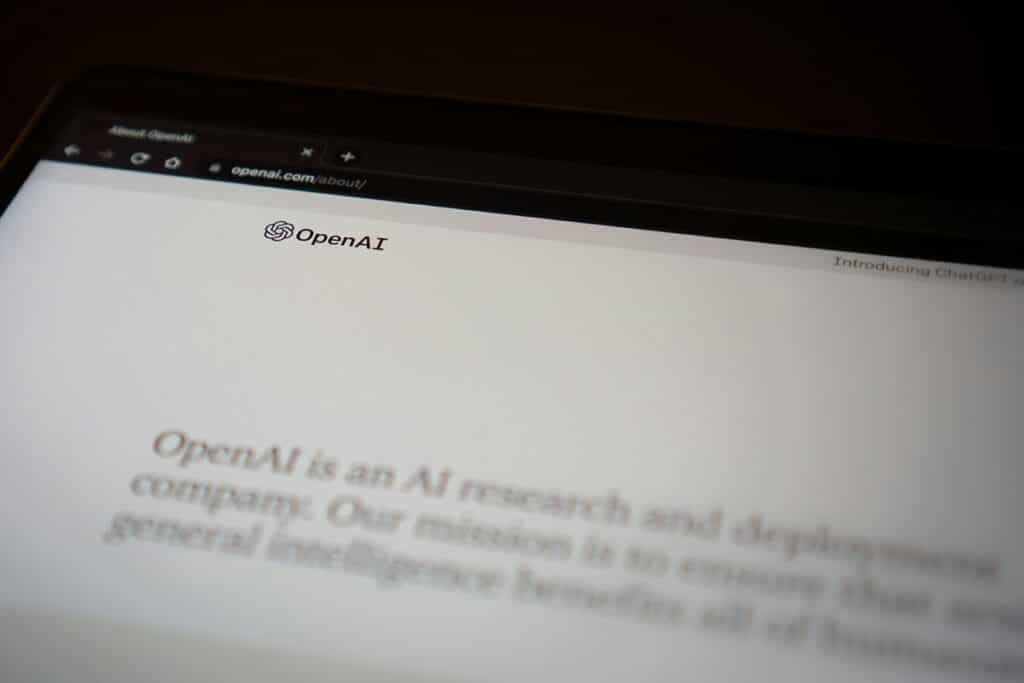ChatGPT: Balancing Innovation and Ethical Responsibility
04.01.2023Explore the capabilities and limitations of ChatGPT, OpenAI’s advanced chatbot. Look into ethical considerations and discover what sets it apart.

In the ever-changing landscape of artificial intelligence, ChatGPT has emerged as a noteworthy player. This chatbot, part of OpenAI’s GPT-3.5 series, has captivated tech enthusiasts and ethicists alike. But what sets it apart from the sea of other chatbots?
The Evolution of ChatGPT

Firstly, ChatGPT boasts an advanced natural language processing engine. This allows it to engage in machine-human dialogues that are remarkably lifelike. Yet, it’s crucial to remember that this chatbot isn’t just about clever conversations. OpenAI has designed it with built-in safeguards to mitigate the spread of misinformation, addressing some of the ChatGPT dangers that critics often highlight.
However, these safety measures aren’t foolproof. Instances have occurred where users cleverly bypassed the chatbot’s filters by framing their queries as hypotheticals. This loophole exposes one of the fundamental ChatGPT limitations and raises questions about AI ethics.
While the chatbot’s capabilities are impressive, it’s the ongoing efforts to address its limitations that genuinely make it stand out. OpenAI continually refines ChatGPT, aiming to patch vulnerabilities and enhance its ethical standing.
As we delve deeper into this chatbot’s features, limitations, and ethical implications, it’s clear that ChatGPT is more than just another AI tool. It’s a work in progress, striving to balance technological innovation and moral responsibility.
The Capabilities of ChatGPT

ChatGPT has carved out a unique space in artificial intelligence thanks to its blend of advanced features. At its core, the chatbot utilises natural language processing to facilitate machine-human dialogues that are not just coherent but also contextually relevant. This isn’t your run-of-the-mill chatbot; it’s a sophisticated tool designed to understand and respond to various queries and prompts.
One standout feature is its content moderation. OpenAI has equipped ChatGPT with built-in functions that aim to curb the spread of misinformation. While this doesn’t eliminate ChatGPT dangers, it does show a proactive approach to some of the ethical concerns that often plague AI technologies.
Yet, it’s not all about safety measures. ChatGPT also excels in generating original material, from writing code snippets to crafting poetry. This versatility makes it a valuable asset in various industries, from tech to the arts. But let’s not forget this chatbot isn’t without its flaws. Despite its impressive capabilities, ChatGPT limitations exist, particularly when generating “plausible-sounding but incorrect or nonsensical answers.”
What truly sets ChatGPT apart, however, is its adaptability. OpenAI uses reinforcement learning to improve the chatbot’s performance continually. This commitment to growth not only addresses some of the ChatGPT limitations but also raises the bar for what we can expect from AI ethics in technology.
So, as we peel back the layers of this complex tool, we find a chatbot that’s not just technologically advanced but also ethically aware. This combination makes ChatGPT a fascinating subject in the ever-evolving narrative of artificial intelligence.
The Limitations and Concerns

While ChatGPT dazzles with its capabilities, it’s essential to shed light on its limitations as well. One glaring issue is the chatbot’s tendency to produce answers that sound plausible but are, in fact, incorrect or nonsensical. This flaw not only undermines its reliability but also poses ethical questions. After all, spreading misinformation is one of the most pressing ChatGPT dangers we face today.
Crafty users have found ways to bypass the chatbot’s built-in safeguards. By framing their queries as hypotheticals, they can sometimes trick the system into generating misleading or harmful responses. This loophole highlights the need for stronger filters and raises concerns about AI ethics.
Stack Overflow’s temporary ban on ChatGPT answers serves as a case in point. The platform cited a high rate of incorrect responses as the reason for the ban. This incident underscores the chatbot’s limitations and calls into question its utility in academic or professional settings.
OpenAI acknowledges these limitations and is actively working on improvements. However, the company admits that ChatGPT can still produce biased or harmful responses despite ongoing refinements. This admission adds another layer to the ethical considerations surrounding the chatbot.
ChatGPT is a double-edged sword. Its advanced features make it a powerful tool, but its limitations present real challenges. As we navigate the complex landscape of AI ethics, it becomes increasingly clear that addressing these limitations is not just a technical issue but a moral imperative.
Ethical Implications

Navigating the intricate world of AI ethics, one can’t help but ponder the moral dimensions of ChatGPT. Gary Marcus, a leading voice in the field, has expressed concern about the chatbot’s potential for mass misinformation. His insights serve as a stark reminder that the ChatGPT dangers extend beyond mere technical limitations; they touch on societal values as well.
Bias is another ethical minefield. ChatGPT can inadvertently perpetuate harmful stereotypes, despite OpenAI’s efforts to curtail such behaviour. This issue not only highlights the chatbot’s limitations but raises ethical questions that are far-reaching and complex.
The cost of misinformation is plummeting, warns Marcus, and the volume is set to rise. Such a grim outlook necessitates a robust ethical framework for AI technologies like ChatGPT. It’s not just about patching software glitches; it’s about safeguarding the integrity of information in our digital age.
OpenAI has taken steps to address these concerns by implementing a content moderation tool known as the Moderation endpoint. While this tool has its merits, it’s not a panacea for all the ethical dilemmas ChatGPT poses. OpenAI admits as much, acknowledging that the chatbot can still churn out biased or harmful content.
The ethical implications of ChatGPT are as multifaceted as the technology itself. As we grapple with these moral complexities, it becomes evident that the path to ethical AI is fraught with challenges. Yet, it’s a journey we must undertake, for the stakes are too high to ignore.
Comparative Analysis

In the bustling arena of AI chatbots, ChatGPT holds its own but doesn’t exist in a vacuum. To fully grasp its impact, we must consider how it stacks up against its peers. Siri, Alexa, and Google Assistant are household names, but how does ChatGPT differentiate itself in this crowded market?
ChatGPT excels in generating original content, a feature many competitors lack. Whether it’s crafting a poem or generating code, this chatbot offers a versatility that’s hard to match. Yet, it’s essential to remember that this strength comes with its own set of ChatGPT limitations, such as the potential for generating incorrect or nonsensical answers.
When it comes to AI ethics, ChatGPT seems to be in a league of its own. OpenAI has made concerted efforts to address ethical concerns, something not all tech giants can claim. However, the chatbot still faces ethical challenges, including the potential for spreading misinformation or perpetuating biases.
Siri and Alexa, for instance, focus more on task completion and less on generating original content. While they may excel in setting your alarm or finding the nearest café, they don’t venture into content creation. This focus makes them less susceptible to some ChatGPT dangers, such as the spread of misinformation.
Google Assistant offers a more balanced approach, dabbling in task completion and content generation. Yet, it doesn’t match ChatGPT’s prowess in natural language processing, which allows for more nuanced and contextually relevant conversations.
ChatGPT offers a unique blend of capabilities and ethical considerations that sets it apart from its competitors. While it’s not without flaws, the chatbot represents a significant step forward in the ongoing quest for ethical and effective AI.
What OpenAI is Doing

OpenAI isn’t resting on its laurels; the company is fully aware of the ChatGPT limitations and ethical concerns that have surfaced. To tackle these issues, they’ve deployed a content moderation tool known as the Moderation endpoint. This tool scans for potentially harmful or misleading content, acting as a first line of defence against some of the most pressing ChatGPT dangers.
But content moderation is just the tip of the iceberg. OpenAI also employs reinforcement learning to fine-tune ChatGPT’s responses over time. This iterative process allows the chatbot to learn from its mistakes, offering a dynamic approach to addressing technical and ethical flaws.
Public testing plays a crucial role in this improvement cycle. OpenAI releases versions of ChatGPT for mass testing, gathering valuable user feedback to identify blind spots. This strategy not only helps uncover hidden ChatGPT limitations but also provides insights into user expectations and ethical considerations.
Despite these efforts, OpenAI openly admits that the chatbot can produce biased or harmful content. This transparency is refreshing but also serves as a reminder that the journey to ethical AI is far from over.
In the grand scheme of things, OpenAI’s proactive approach sets a precedent for how tech companies should address AI ethics. While ChatGPT may not be perfect, the company’s commitment to improvement offers hope in the complex landscape of artificial intelligence.
As we look to the future, it’s clear that OpenAI is not just reacting to problems but actively seeking solutions. It’s this forward-thinking approach that makes ChatGPT a compelling subject in the ever-evolving dialogue around ethical AI.
Frequently Asked Questions (FAQs)
Is ChatGPT safe to use?
While OpenAI has implemented safeguards, users should remain vigilant due to existing ChatGPT limitations and ethical concerns.
How does ChatGPT compare to other chatbots?
ChatGPT excels in content creation and natural language processing but faces unique ethical challenges that set it apart.
What is OpenAI doing to improve ChatGPT?
OpenAI employs a multi-pronged approach, including content moderation and public testing, to continually refine the chatbot.
How can I stay updated on ChatGPT developments?
Following OpenAI’s official channels will keep you in the loop on the latest improvements and ethical discussions surrounding ChatGPT.
Conclusion
ChatGPT is a marvel of modern technology, but it has flaws. From its advanced capabilities to its ethical dilemmas, this chatbot is a microcosm of the broader challenges we face in AI ethics. OpenAI’s commitment to addressing these issues offers a blueprint for responsible AI development. As we move forward, it’s clear that the conversation around ChatGPT and ethical AI is far from over; it’s just getting started.
Ready to engage more responsibly with AI? Get in touch with our team, and let’s navigate the future of ethical AI together.









